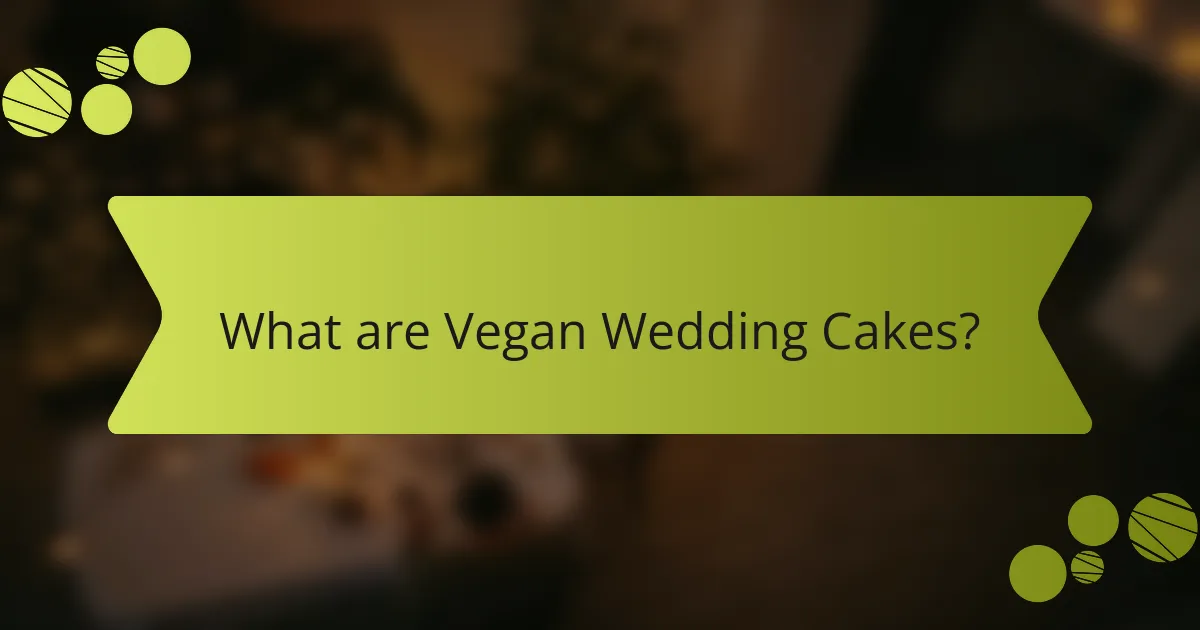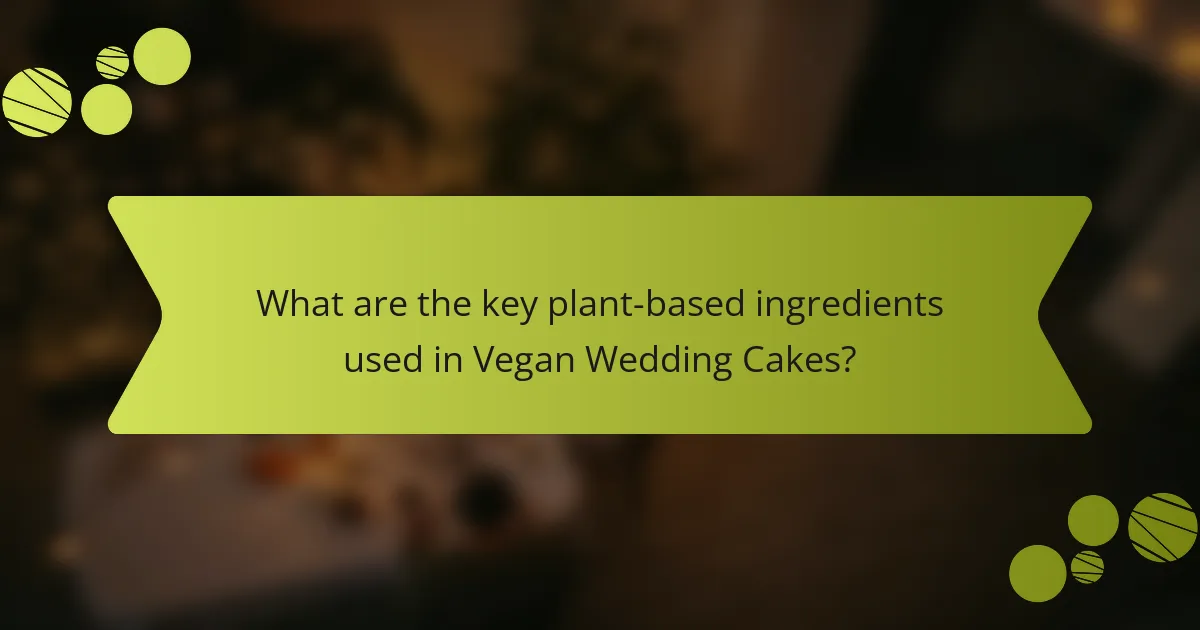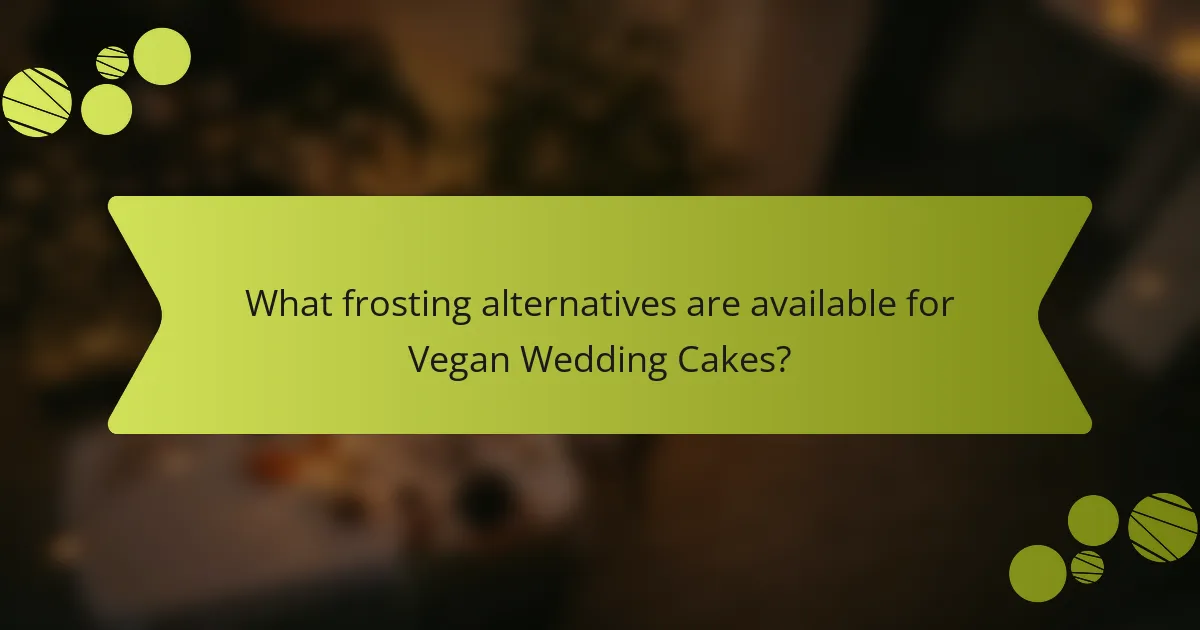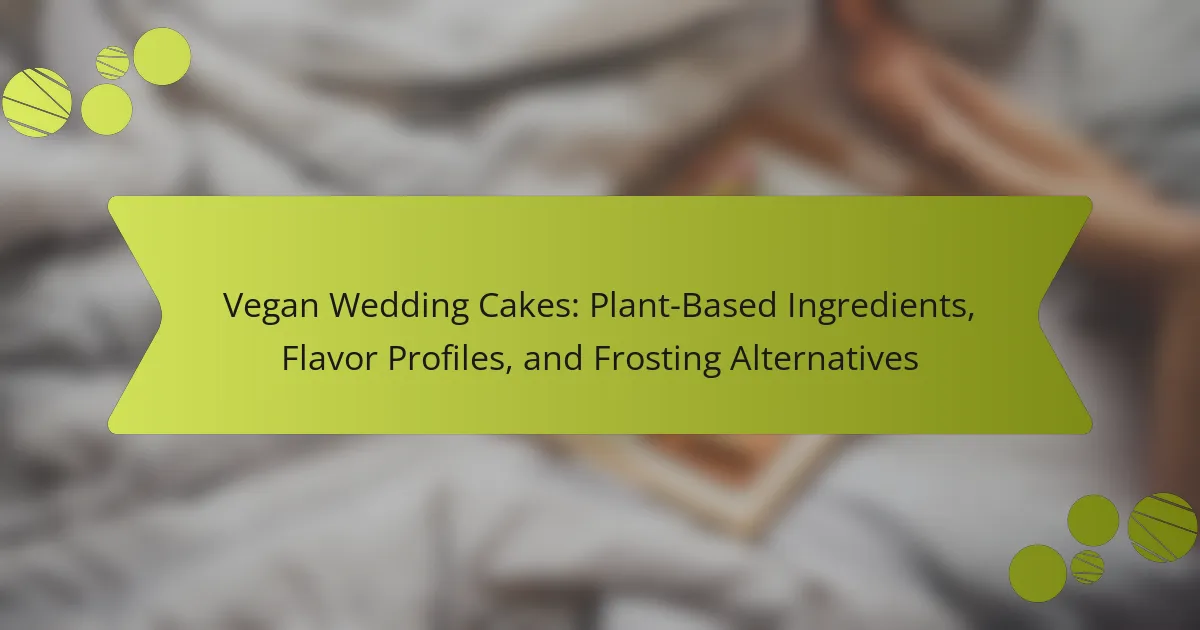Vegan wedding cakes are cakes crafted without animal products, utilizing plant-based ingredients such as flour, sugar, and non-dairy milk. Key components include common egg substitutes like applesauce and flaxseed meal, along with oils such as coconut or vegetable oil to add moisture. The article explores the rich flavor profiles achievable with vegan wedding cakes, highlighting various plant-based frosting alternatives, including coconut cream and aquafaba meringue. These cakes cater to vegans and individuals with dairy allergies, proving that they can be both delicious and visually appealing for wedding celebrations.

What are Vegan Wedding Cakes?
Vegan wedding cakes are cakes made without any animal products. They typically use plant-based ingredients such as flour, sugar, and non-dairy milk. Common egg substitutes include applesauce, flaxseed meal, or aquafaba. Vegan butter or coconut oil often replaces traditional butter. These cakes can be flavored with fruits, spices, and extracts. They are suitable for vegans and those with dairy allergies. Vegan wedding cakes can be just as rich and flavorful as traditional cakes. Many bakers specialize in creating unique vegan cake recipes for weddings.
How do Vegan Wedding Cakes differ from traditional wedding cakes?
Vegan wedding cakes differ from traditional wedding cakes primarily in their ingredients. Traditional wedding cakes often contain eggs and dairy, which are animal products. Vegan wedding cakes, on the other hand, use plant-based alternatives. Common substitutes include flaxseed meal or applesauce for eggs and almond or coconut milk instead of dairy.
These ingredient choices affect the texture and flavor profile of the cake. Vegan cakes can be just as moist and flavorful when prepared correctly. They often incorporate ingredients like nut butters, fruits, or purees to enhance taste.
In terms of frosting, traditional cakes typically use buttercream made from dairy butter. Vegan cakes utilize vegan butter, coconut cream, or cashew-based frostings. This results in a different mouthfeel and flavor, but can still be rich and satisfying.
Overall, the primary differences lie in the absence of animal products and the alternative ingredients used to achieve similar textures and flavors.
What are the key ingredients that make a cake vegan?
Key ingredients that make a cake vegan include plant-based substitutes for traditional animal products. Common replacements are flour, sugar, and baking powder for the base. Instead of eggs, ingredients like flaxseed meal or applesauce are used for binding. Dairy milk is replaced with plant-based milks such as almond, soy, or oat milk. Oils or vegan butters serve as fat sources instead of butter. Additionally, ingredients like cocoa powder or fruit purees can enhance flavor without animal products. These substitutions ensure the cake remains free from animal-derived ingredients.
How does the absence of animal products affect the cake’s texture and taste?
The absence of animal products affects a cake’s texture and taste by altering its moisture content and density. Without eggs, cakes may become denser and require additional leavening agents to achieve fluffiness. Plant-based alternatives like flaxseed or aquafaba can mimic egg properties but may not replicate the exact texture. The absence of dairy can also lead to a different flavor profile, often resulting in a more pronounced sweetness due to the lack of creaminess. Vegan cakes may benefit from added ingredients like applesauce or nut milks to enhance moisture and flavor. Studies show that cakes made with plant-based ingredients can be equally enjoyable when balanced correctly.
Why choose a Vegan Wedding Cake for your special day?
Choosing a vegan wedding cake offers several benefits for your special day. Vegan cakes are made without animal products, making them suitable for guests with dietary restrictions. They often contain healthier ingredients, such as fruits, nuts, and whole grains. This can lead to a lighter cake that is still delicious.
Moreover, vegan cakes can be just as flavorful as traditional cakes. Many bakers use innovative techniques to enhance taste and texture. For instance, plant-based milks and natural sweeteners are commonly used. Vegan cakes can also cater to various dietary needs, including lactose intolerance and egg allergies.
Additionally, choosing a vegan cake supports sustainable practices. The production of plant-based ingredients typically has a lower environmental impact. This choice reflects a commitment to health and eco-friendliness. Overall, a vegan wedding cake can be a thoughtful and inclusive option for your celebration.
What are the environmental benefits of opting for a vegan cake?
Vegan cakes offer significant environmental benefits. They typically require fewer natural resources than traditional cakes. The production of plant-based ingredients uses less water and land. For example, producing plant-based foods generally requires 56% less water than animal-based foods. Additionally, vegan cakes contribute to lower greenhouse gas emissions. Animal agriculture is responsible for a substantial portion of global emissions. Choosing vegan options helps reduce one’s carbon footprint. Studies show that adopting a vegan diet can cut individual carbon emissions by up to 73%. Overall, opting for a vegan cake supports sustainable practices and reduces environmental impact.
How can a vegan cake cater to dietary restrictions?
A vegan cake can cater to dietary restrictions by eliminating all animal products. This includes avoiding eggs, dairy, and honey. Instead, plant-based ingredients serve as substitutes. For example, applesauce or flaxseed can replace eggs. Almond milk or coconut cream can substitute dairy. Vegan cakes can also be gluten-free by using alternative flours like almond or coconut flour. They can be made nut-free by using seed-based alternatives. These substitutions allow the cake to meet various dietary needs. Vegan cakes are versatile and can accommodate multiple restrictions simultaneously. This adaptability makes them suitable for diverse guests at events like weddings.
What are the popular flavor profiles for Vegan Wedding Cakes?
Popular flavor profiles for vegan wedding cakes include vanilla, chocolate, and lemon. Vanilla is often favored for its classic taste and versatility. Chocolate provides a rich flavor that appeals to many couples. Lemon offers a refreshing and zesty option, particularly for spring and summer weddings. Other notable flavors are red velvet, almond, and coconut. Red velvet adds a touch of elegance with its unique color and taste. Almond brings a nutty essence that complements various fillings. Coconut introduces a tropical twist, enhancing the cake’s overall appeal. These flavors are commonly chosen for their broad acceptance and ability to pair well with various frostings and fillings.
What unique flavor combinations can be achieved with plant-based ingredients?
Unique flavor combinations with plant-based ingredients include chocolate and avocado, which create a creamy texture. Another combination is lemon and coconut, offering a refreshing zest. Pairing beetroot with chocolate results in a rich, earthy flavor. Mango and lime create a tropical, tangy profile. Almond and orange blossom yield a fragrant, nutty taste. Combining matcha and mint provides a vibrant, herbal experience. These combinations enhance the overall flavor profile of vegan wedding cakes.
How do different plant-based milks influence the flavor of the cake?
Different plant-based milks influence the flavor of cake in distinct ways. Almond milk adds a subtle nuttiness, enhancing the overall taste. Soy milk has a neutral flavor, allowing other ingredients to shine. Coconut milk contributes a rich, tropical sweetness, altering the cake’s profile significantly. Oat milk offers a creamy texture with a mild sweetness, complementing various flavors. Rice milk is lighter and can create a more delicate taste. Each type of plant-based milk interacts with sweeteners and spices differently, affecting the final flavor. The choice of milk can also impact the cake’s moisture and density, contributing to the overall eating experience.

What are the key plant-based ingredients used in Vegan Wedding Cakes?
Key plant-based ingredients used in vegan wedding cakes include flour, sugar, plant-based milk, and oils. Flour serves as the primary structure, typically using all-purpose or whole wheat varieties. Sugar provides sweetness, often sourced from cane or beet. Plant-based milk, such as almond or soy, acts as a liquid component, replacing dairy milk. Oils, like coconut or vegetable oil, contribute moisture and richness. Additionally, ingredients like flaxseed or applesauce can be used as egg replacers, binding the mixture together. These ingredients collectively ensure the cake remains delicious and appealing while adhering to vegan dietary standards.
How do different flours impact the structure of a vegan cake?
Different flours significantly impact the structure of a vegan cake. Each type of flour has unique properties that affect texture, moisture, and stability. For instance, all-purpose flour provides a balanced structure, resulting in a tender crumb. Whole wheat flour adds density and a nutty flavor, which can make the cake heavier. Almond flour contributes moisture and a rich taste but may require additional binding agents to maintain structure. Coconut flour absorbs more liquid, leading to a drier texture if not adjusted properly. Gluten-free flours, like rice or oat flour, may require combinations to achieve a stable structure. The choice of flour directly influences the cake’s rise and overall mouthfeel.
What types of flour are commonly used in vegan baking?
Common types of flour used in vegan baking include all-purpose flour, whole wheat flour, almond flour, and coconut flour. All-purpose flour is versatile and widely available. Whole wheat flour adds nutritional value and a nutty flavor. Almond flour is gluten-free and provides moisture. Coconut flour is also gluten-free and absorbs a lot of liquid. These flours contribute different textures and flavors to vegan baked goods. Their varied properties allow for creative and diverse vegan recipes.
How can gluten-free options be incorporated into vegan cakes?
Gluten-free options can be incorporated into vegan cakes by using alternative flours. Common choices include almond flour, coconut flour, and gluten-free all-purpose flour blends. These flours provide structure and texture without gluten. Additionally, incorporating ingredients like ground flaxseed or chia seeds can act as binding agents. These ingredients help mimic the texture usually provided by gluten.
It is essential to adjust liquid ratios when using these flours. Gluten-free flours often absorb more moisture. Therefore, increasing the liquid content in the recipe may be necessary. Baking powder or baking soda can also be used to ensure proper rising. This combination allows for a light and fluffy cake texture.
Using these methods, vegan cakes can successfully be made gluten-free while maintaining flavor and quality.
What are the best substitutes for eggs in vegan baking?
The best substitutes for eggs in vegan baking include flaxseed meal, chia seeds, applesauce, and silken tofu. Flaxseed meal and chia seeds can replace one egg with one tablespoon of ground seeds mixed with three tablespoons of water. This mixture creates a gel-like consistency that binds ingredients. Applesauce can substitute one egg with a quarter cup, adding moisture and sweetness. Silken tofu can replace one egg with a quarter cup, providing density and creaminess. Additionally, commercial egg replacers are available, offering convenience and consistency in recipes. These substitutes effectively mimic the binding and moisture-retaining properties of eggs in baked goods.
How do various egg replacements affect the cake’s rise and moisture?
Various egg replacements can significantly impact a cake’s rise and moisture. Ingredients like applesauce or mashed bananas add moisture but may not provide sufficient structure. Conversely, aquafaba can mimic egg whites, contributing to a better rise due to its aeration properties. Silken tofu offers a dense texture, which can lead to a heavier cake but retains moisture effectively. Ground flaxseed or chia seeds create a gel-like consistency, promoting moisture retention but may slightly reduce rise. Each replacement interacts differently with the cake batter, affecting the final texture and flavor. Research indicates that the choice of egg substitute plays a crucial role in achieving desired baking outcomes.
What are the most popular egg substitutes for vegan wedding cakes?
The most popular egg substitutes for vegan wedding cakes include applesauce, flaxseed meal, and aquafaba. Applesauce acts as a binding agent and adds moisture. Typically, a quarter cup of applesauce replaces one egg. Flaxseed meal mixed with water creates a gel-like consistency, serving as an effective binder. One tablespoon of flaxseed meal combined with three tablespoons of water substitutes one egg. Aquafaba, the liquid from canned chickpeas, can mimic egg whites. Three tablespoons of aquafaba replace one egg in recipes. These substitutes are widely used in vegan baking for their effectiveness and availability.

What frosting alternatives are available for Vegan Wedding Cakes?
Frosting alternatives for vegan wedding cakes include options such as coconut cream frosting, cashew cream frosting, and aquafaba meringue. Coconut cream frosting is made from whipped coconut cream and offers a rich, creamy texture. Cashew cream frosting involves blending soaked cashews with plant-based milk and sweeteners for a smooth consistency. Aquafaba meringue utilizes the liquid from chickpeas, whipped to create a light, airy frosting. Other alternatives include fruit-based frostings made from pureed fruits and nut butter frostings that provide a unique flavor profile. These options ensure that vegan wedding cakes can be both delicious and visually appealing.
How do vegan frostings differ from traditional frostings?
Vegan frostings differ from traditional frostings primarily in their ingredient composition. Traditional frostings often contain dairy products like butter and cream. In contrast, vegan frostings use plant-based alternatives such as coconut oil, vegan butter, or nut-based creams. This substitution eliminates animal-derived ingredients, making them suitable for a vegan diet.
Additionally, vegan frostings may incorporate ingredients like aquafaba or cashew cream for texture and stability. These alternatives can provide similar creaminess and spreadability as traditional frostings. The flavor profiles can also differ slightly due to the use of different fats and sweeteners.
Vegan frostings can be just as versatile as traditional ones, allowing for various flavors and colors. They can achieve similar levels of sweetness and richness, appealing to a broad audience. The growing popularity of vegan diets has led to more innovative recipes and options in vegan frosting.
What ingredients are commonly used to create vegan frostings?
Common ingredients used to create vegan frostings include plant-based butter, powdered sugar, and non-dairy milk. These ingredients provide a creamy texture and sweetness similar to traditional frostings. Other common ingredients are coconut cream and cashew cream, which add richness. Flavorings like vanilla extract and cocoa powder are also frequently incorporated. Vegan frostings can be colored using natural food dyes made from fruits or vegetables. The use of these ingredients ensures that the frosting remains free from animal products while still being delicious and appealing.
How can texture be achieved in vegan frosting without dairy?
Texture in vegan frosting can be achieved using plant-based ingredients. Common options include coconut cream, nut butters, and aquafaba. Coconut cream provides a rich, creamy consistency. Nut butters add thickness and a unique flavor. Aquafaba, the liquid from canned chickpeas, can be whipped to create a light, airy texture.
Additionally, using powdered sugar helps create a smooth consistency. Incorporating vegetable shortening can also contribute to a fluffy texture. These ingredients work together to replicate the creaminess typically provided by dairy. Many bakers utilize these alternatives to ensure a satisfying mouthfeel in vegan frostings.
What are the best flavor options for vegan frostings?
The best flavor options for vegan frostings include chocolate, vanilla, lemon, and almond. Chocolate frosting often uses cocoa powder or melted dark chocolate. Vanilla frosting typically relies on vanilla extract for its flavor. Lemon frosting incorporates fresh lemon juice and zest for a tangy taste. Almond frosting uses almond extract, providing a distinct nutty flavor. Other popular options are coconut, coffee, and berry-infused frostings. Coconut frosting can be made with coconut cream or shredded coconut. Coffee frosting combines instant coffee or espresso for a rich flavor. Berry frostings use pureed fruits like strawberries or raspberries for a fruity twist. These flavors can be enhanced with natural extracts and spices to create unique combinations.
How can natural sweeteners be incorporated into vegan frostings?
Natural sweeteners can be incorporated into vegan frostings by using options like maple syrup, agave nectar, or coconut sugar. These sweeteners can replace refined sugars in frosting recipes. For instance, maple syrup adds moisture and flavor while sweetening the frosting. Agave nectar has a mild taste and dissolves easily, making it suitable for smooth frostings. Coconut sugar can be blended into a fine powder for a more traditional texture.
When using liquid sweeteners, adjust the other liquid ingredients in the frosting to maintain the desired consistency. For example, reduce plant milk or oil slightly when using maple syrup. This ensures the frosting remains thick and spreadable.
Coconut sugar can also provide a caramel-like flavor, enhancing the overall taste profile of the frosting. This versatility allows for creativity in flavor combinations, such as pairing coconut sugar with vanilla or chocolate.
Overall, natural sweeteners can effectively enhance the sweetness and flavor of vegan frostings while maintaining a plant-based approach.
What are some creative flavor combinations for vegan frosting?
Vegan frosting can feature creative flavor combinations like chocolate and orange, vanilla and almond, or coconut and lime. Chocolate and orange create a rich and zesty profile. Vanilla and almond provide a classic yet unique taste. Coconut and lime offer a tropical twist. Other combinations include matcha and mint, peanut butter and banana, or lavender and lemon. Matcha and mint deliver a refreshing and earthy flavor. Peanut butter and banana create a creamy and sweet experience. Lavender and lemon provide a floral and tangy contrast. These combinations enhance the overall taste of vegan cakes.
What tips should you consider when planning a Vegan Wedding Cake?
When planning a Vegan Wedding Cake, prioritize plant-based ingredients. Use substitutes like applesauce or flaxseed for eggs. Opt for dairy-free milk alternatives such as almond or coconut milk. Choose high-quality vegan butter or coconut oil for a rich texture. Incorporate natural sweeteners like maple syrup or agave nectar instead of refined sugar. Experiment with various flavor profiles, including chocolate, vanilla, or fruit-infused options. Ensure all decorations and frostings are vegan, utilizing options like coconut cream or vegan cream cheese. Lastly, consider the dietary preferences of your guests to ensure inclusivity.
How can you ensure your vegan cake is visually appealing?
To ensure your vegan cake is visually appealing, focus on color, texture, and decoration. Use vibrant fruits and edible flowers for natural color. Incorporate layers and varied textures to create visual interest. Choose a smooth frosting finish for a polished look. Use piping techniques to add intricate designs. Add decorative elements like sprinkles or chocolate shavings for contrast. Consider using cake stands or decorative plates to enhance presentation. Research shows that visual appeal significantly influences perceived taste (Source: “The Role of Visual Appearance in Food Perception,” Authors: A. Smith, J. Doe).
What should you keep in mind when selecting a baker for your vegan cake?
When selecting a baker for your vegan cake, prioritize their experience with vegan baking. Look for bakers who specialize in vegan desserts. Verify their knowledge of plant-based ingredients and substitutes. Check if they offer a variety of flavors and styles. Request samples to assess the taste and texture of their vegan cakes. Inquire about their sourcing of ingredients to ensure quality. Read reviews or testimonials from previous clients for insights on their service. Confirm their ability to accommodate specific dietary restrictions, if necessary.
Vegan wedding cakes are cakes made entirely from plant-based ingredients, excluding any animal products. This article explores the differences between vegan and traditional wedding cakes, highlighting key ingredients such as plant-based milks, egg substitutes, and alternative flours that maintain flavor and texture. It also discusses popular flavor profiles, frosting alternatives, and the environmental benefits of choosing vegan options. Additionally, the article provides tips for selecting a baker and ensuring the visual appeal of the cake, catering to various dietary restrictions.
